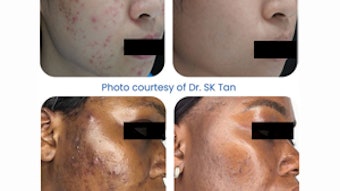New York is the only state that does not regulate laser hair removal.
Виталий Сова - stock.adobe.com
New York is the only state in the United States that does not regulate laser hair removal. There is no board overseeing the businesses and no experience or training is required to perform the treatment. Without proper regulations, patients face a multitude of increased safety risks. Despite trying for several years, no New York State Legislature has been able to gain enough support to amend the situation, according to an article from the American Med Spa Association (AmSpa).
Related: New Med Spa Federal Business Requirements + Updated State Guidelines on IV Therapy
Practice of Medicine
All other states treat laser hair removal as a practice of medicine. Most of those states don’t have a specific law regarding LHR; instead, the treatment is included automatically within the practice of medicine definition, according to AmSpa.
In the 1930s, a New York court heard a case regarding electrolysis and whether it constituted the practice of medicine. After analyzing the state’s definition of medicine, the court concluded that the state legislature would not have intended for the practice of medicine to extend to barbers shaving a face or a manicurist cutting nails. They concluded that simply removing hair, by electrolysis in this case, cannot be considered practicing medicine either.
Several bills have been introduced in both the New York Senate and General Assembly to create a new laser hair removal license under Appearance Enhancement, similar to estheticians, cosmetologists or nail technicians. The new legislation would require laser hair removal technicians to undergo basic education and training and for a medical supervisor to be present at every laser hair removal facility. AmSpa reports that these changes would make New York similar to several other states that license non-medical practitioners for laser hair removal but require some level of medical oversight in the process. So far, no bill has gained enough support to make it out of the assembly.
Until a few years ago, Virginia was the only other state to not regulate laser hair removal. The state ended up passing regulations after a patient injury story garnered enough attention and public sentiment to get the attention of lawmakers.
Other Aesthetic Procedures in Need of Regulations
Laser hair removal isn't the only aesthetic treatment that has lacked regulations due to it not being defined as a practice of medicine. Many experts are calling for further regulations and training for IV therapy, popular for its ability to administer various vitamins and nutrients needed by the body. With its growing popularity, state medical boards are discovering a need to provide guidelines and recommendations for IV therapy, including who can perform it.
Alabama first issued a definite ruling that sought to provide the clarity needed for IV therapy in November 2022. The ruling clarified different practitioners’ roles in administering IV therapy. Additionally, the ruling addressed core healthcare compliance issues associated with IV therapy that purportedly concerned the Alabama Board of Medical Examiners (BME). Since then, other states have introduced new recommendations and guidelines for the administration of IV therapy.
Florida’s first plastic surgery bill, HB 1471, which details specific training and educational measures to properly perform gluteal fat grafting procedures, went into effect on July 1, 2023. The bill mandates the use of ultrasound guidance to ensure fat is only being injected into the subcutaneous space. It also prohibits surgeons from meeting patients for the first time on the day of the surgery and forbids them from delegating the surgical procedure to a nurse or an assistant.
The law has been praised by industry experts, including the American Academy of Cosmetic Surgery (AACS) and the American Board of Cosmetic Surgery (ABCS).













































